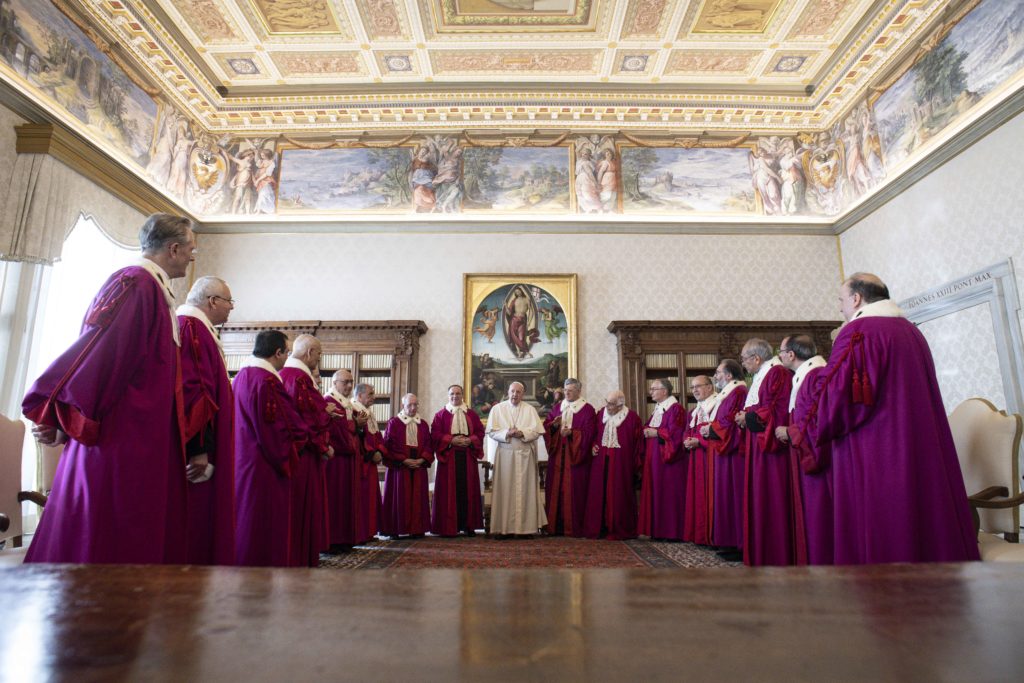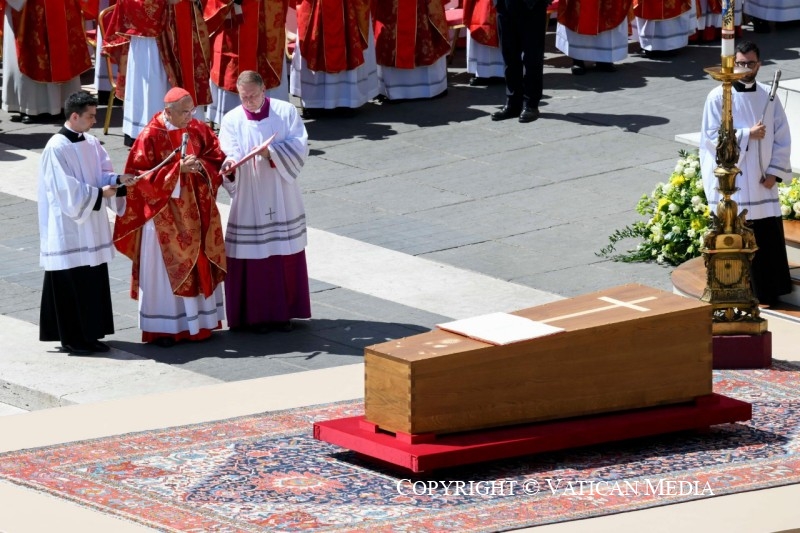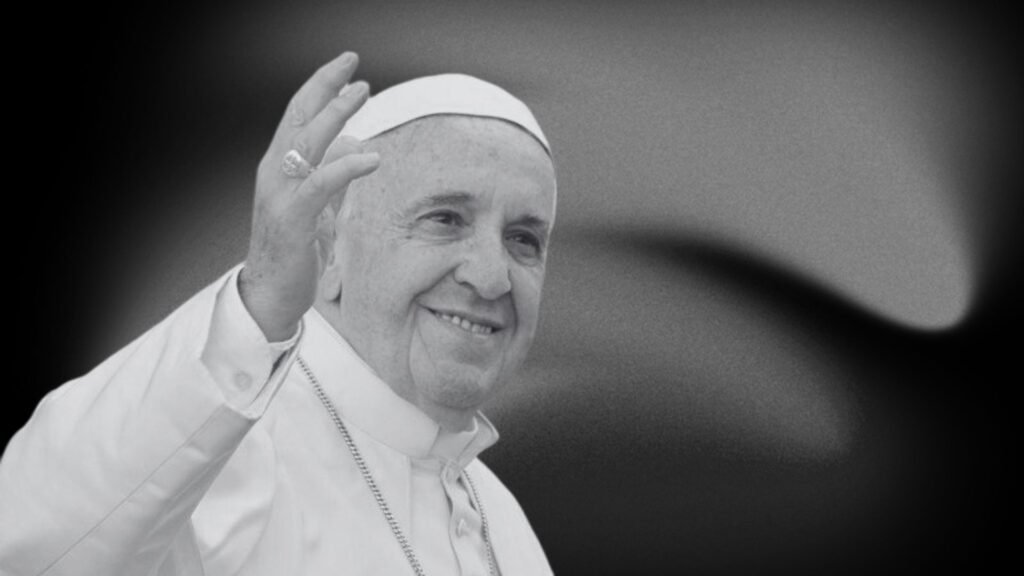Pope Urges Shared Seeking of Truth to Roman Rota
'Must Characterize Every Stage of the Judicial Process'

“A shared seeking of the truth must characterize every stage of the judicial process,” Pope Francis told members of the Roman Rota today.
The the Holy Father received in audience, in the Clementine Hall of the Vatican’s Apostolic Palace, the Prelate Auditors, the Officials, the Lawyers, and the Collaborators of the Tribunal of the Roman Rota, on the occasion of the solemn inauguration of the Judicial Year.
The Pope stressed that the highest court of the Church must work in “synodality” by “walking together.” This requires careful listening and examination of the facts, he continued, particularly in the many cases that come to the court involving nullification of marriage.
“Already in the pre-judicial phase, when the faithful find themselves in difficulty and seek pastoral help, the effort cannot be lacking to discover the truth about their union, indispensable presupposition to be able to come to the healing of the wounds,” Francis said. “Understood in this framework is the importance of the commitment to foster forgiveness and reconciliation between the spouses, and also to validate eventually the null marriage when that is possible and prudent.
“Thus understood also is that the declaration of nullity is not presented as if it were the only objective to reach in face of a marriage crisis, or as if it constituted a right regardless of the facts. In indicating the possible nullity it is necessary to make the faithful reflect on the motives that move them to request the declaration of nullity of the marriage consensus, thus fostering an attitude of acceptance of the definitive sentence even if the latter does not correspond to one’s conviction. Only in this way are processes of nullity an expression of an effective pastoral accompaniment of the faithful in their marriage crisis, which means listening to the Holy Spirit who speaks in persons’ concrete story.”
Pope Francis went on to emphasize listening and charity as key elements in the judicial process:
“Judges should be listeners par excellence of all that emerged in the process in favor and against the declaration of nullity. They are held to that in virtue of a duty of justice, animated and sustained by pastoral charity.”
Following is Exaudi’s translation of the Holy Father’s address, which was delivered in Italian.
Excellency,
Dear Prelate Auditors!
I give each of you my cordial greeting, beginning with the Dean, Monsignor Alejandro Arellano Cedillo, whom I thank for his words. I greet the Officials, the Lawyers, and the other Collaborators of the Apostolic Tribunal of the Roman Rota. My best wishes to you all for the Judicial Year that we are inaugurating today.
The synodal path we are living also interpellates this meeting of ours because it also involves the judicial ambit and your mission at the service of families, especially those wounded and in need of the balm of mercy.[1] In this year dedicated to the family as an expression of the joy of love, today we have the occasion to reflect on synodality in the processes of marriage annulment. Synodal work, in fact, although it does not have strictly a procedural nature, is still placed in dialogue with judicial activity, in order to foster a more general rethinking of the importance that the experience of the canonical process has for the life of the faithful that have lived a marriage failure and, contemporaneously, for the harmony of relations within the ecclesial community. Let us ask ourselves, then, in what sense the administration of justice needs a synodal spirit.
First of all, synodality implies walking together. Overcoming a distorted view of marriage causes, as if in them were merely affirmed subjective interests, it’s discovered that all the participants in the process are called to agree on the same objective, to make the truth shine on a concrete union between a man and a woman, reaching the conclusion on the existence or not of a true marriage between them. This vision of walking together towards a common end is not new in the ecclesial understanding of these processes. Famous in this connection is the address to the Roman Rota, in which the Venerable Pius XII affirmed “the unity of the purpose, which must give a special form to the work and to the collaboration of all those that take part in the treatment of marriage causes in ecclesiastical tribunals of every degree and kind, and must encourage them and join them in one same unity of intent and action.”[2] He traced, in this perspective, the task of every participant in the process ordered to the search of the truth, although each one being faithful to his role. This truth, if really loved, becomes liberating.[3]
Already in the pre-judicial phase, when the faithful find themselves in difficulty and seek pastoral help, the effort cannot be lacking to discover the truth about their union, indispensable presupposition to be able to come to the healing of the wounds. Understood in this framework is the importance of the commitment to foster forgiveness and reconciliation between the spouses, and also to validate eventually the null marriage when that is possible and prudent. Thus understood also is that the declaration of nullity is not presented as if it were the only objective to reach in face of a marriage crisis, or as if it constituted a right regardless of the facts. In indicating the possible nullity it is necessary to make the faithful reflect on the motives that move them to request the declaration of nullity of the marriage consensus, thus fostering an attitude of acceptance of the definitive sentence even if the latter does not correspond to one’s conviction. Only in this way are processes of nullity an expression of an effective pastoral accompaniment of the faithful in their marriage crisis, which means listening to the Holy Spirit who speaks in persons’ concrete story.
The same objective of a shared seeking of the truth must characterize every stage of the judicial process. It is true that in the process there must be room sometimes for a dialectic between contrasting texts, however, the contradiction between the parties must always unfold in a sincere adherence to that which seems true for each one, without closing oneself in one’s own view, but being open also to the contribution of the other participants in the process. The willingness to offer one’s subjective version of the facts becomes fruitful in the framework of appropriate communication with others, which is also able to attain self-criticism. Hence not admissible is any wilful alteration or manipulation of the facts, geared to getting a desired pragmatic result.
This is true for the parties and their patrons, for the texts called to declare in keeping with the truth, for the experts who must put their science at the service of the process, as well as, in a singular way, for the judges. In fact, the administration of justice in the Church is a manifestation of the care of souls, which requires pastoral solicitude to be servants of the salvific truth and of mercy. This ministerium veritatis assumes a peculiar importance in Bishops, when they judge personally, especially in the briefest processes, as well as when they exercise their responsibility in dealing with their tribunals, thus also showing their paternal solicitude in dealing with the faithful.
Synodality in processes implies a constant exercise of listening. In this ambit, it is also necessary to learn to listen, which is not simply hearing. It is necessary, namely, to understand the view and reasons of the other, almost to empathize with the other. As in other realms of pastoral care, in judicial activity, it is also necessary to foster the culture of listening, presupposition of the culture of encounter. Hence, standard answers to the concrete problems of individual persons are deleterious. Each of them, with their experience often marked by pain, constitutes for the ecclesiastical judge the concrete “existential periphery” by which every judicial pastoral action must be taken.
The process also requires attentive listening to what is argued and demonstrated by the parties. The investigation has particular importance, geared to ascertaining the facts, which exacts in the one leading it to be able to combine just professionalism with closeness and listening. Judges should be listeners par excellence of all that emerged in the process in favor and against the declaration of nullity. They are held to that in virtue of a duty of justice, animated and sustained by pastoral charity. In fact, “mercy is the fulness of justice and the most luminous manifestation of the truth of God” (Post-Synodal Apostolic Exhortation Amoris Laetitia, 311). Moreover, when – as happens regularly – there is a panel of judges, every judge must open himself to the reasons presented by the other members to reach a pondered judgment. In this connection, in your actions as ministers of the tribunal, a pastoral heart must never be lacking, a spirit of charity and of understanding of the persons suffering due to the failure of their conjugal life. To acquire such a style it is necessary to avoid the blind alley of juridicism, namely, of a self-referential view of the law. The law and the judgment are always at the service of truth, of justice, and of the evangelical virtue of charity.
Another aspect of synodality of the processes is discernment. It is a discernment based on walking together and on listening, which enables one to read the concrete marriage situation in the light of the Word of God and of the teaching of the Church. Thus the judges’ decision appears as their having immersed themselves in the reality of a vital event, to discover in it the existence or not of that irrevocable event, which is the valid consensus on which the marriage is founded. Only in this way can the laws regarding the individual forms of marriage nullity be applied fruitfully, as expressions of the doctrine and the discipline of the Church on marriage. Operating here is the prudence of law, in its classic sense of recta ratio agibilium, namely of virtue that judges according to reason, that is, with rectitude in the practical realm.
The success of this path is the sentence, fruit of attentive discernment, which leads to an authoritative word of truth on the personal experience, thus highlighting the paths that can open from there. Hence, the sentence must be comprehensible for the persons involved: only thus will it be regarded as a moment of special importance in their human and Christian path.
Dear Prelate Auditors, from these considerations that I wished to bring to your attention, emerges the dimension of how synodality consents to highlight the essential characteristics of the process. Hence, I encourage you to continue with fidelity and renewed industriousness your ecclesial ministry at the service of justice, inseparable from the truth and, in short, from the salus animarum. A work that manifests the merciful face of the Church: the maternal face that bends down on every faithful to help him to see the truth about himself, raising him from the defeats and toils and inviting him to live in the fulness of the beauty of the Gospel. I express to each of you my esteem and my gratitude. I pray to the Holy Spirit to accompany you always in your activity and I bless you from my heart. Please, do not forget to pray for me.
[1] Cf Bull Misericordiae Vultus, 5: AAS 107 [2015[], 402.
[2] Cf John 8:32.
[3] Allocution to the Roman Rota, October 2, 1944: AAS 36 [1944], 281.
Translation by Virginia M. Forrester
Related

Mercy and the joy of the Gospel are two key concepts of Pope Francis
Exaudi Staff
26 April, 2025
9 min

Thousands of faithful bid farewell to Pope Francis in St. Peter’s Square
Exaudi Staff
26 April, 2025
2 min

Saying Goodbye to Francis
Exaudi Staff
26 April, 2025
2 min

Pope Francis Gifts a Statue of Our Lady of Luján to Gemelli and the Catholic University of the Sacred Heart
Exaudi Staff
25 April, 2025
2 min
 (EN)
(EN)
 (ES)
(ES)
 (IT)
(IT)

